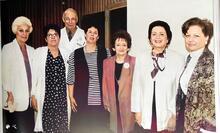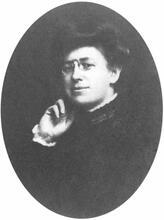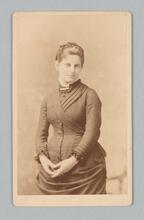Fannie Eller Lorber
When her community became a mecca for adults suffering from tuberculosis, Fannie Eller Lorber created a Jewish children’s home for those who had no one else to care for them. Lorber immigrated to Colorado with her family in 1896 and married Jacob Lorber in 1902. Though she was active in the Jewish Community, Lorber made tuberculosis the focus of her life’s work. Lorber founded the Denver Sheltering Home in 1907 to care for Jewish children and served as president for over fifty years. Unusual for her time, Lorber insisted children receive individual attention and creative outlets, rather than employing the institutional approach used by most orphanages. When vaccines defeated tuberculosis in the late 1940s, Lorber changed her focus to asthma and continued to care for children in her now world-renowned facilities.
Personal Life and Community
Fannie Eller Lorber was Denver’s twentieth-century “friend of children.” The Colorado philanthropist worked on behalf of Jewish children suffering from the devastating effects of lung disease, believing that “the cause of a child is the cause of humanity.” Lorber epitomized the volunteer spirit of urban Jewish women in the American West, where established institutions for the poor and infirm were scarce. She founded the Denver Jewish Sheltering Home for the children of tuberculosis patients in 1907, and remained its president and chief fund-raiser for over fifty years. Later renamed the National Home for Jewish Children (NHJC), the institution merged with the National Jewish Hospital in 1978, and it remains a world-class medical and educational facility. Thousands of the NHJC’s “alumni” are the living legacy of Fannie Lorber and Jewish female philanthropy during the Progressive Era.
Fannie Eller Lorber was born in Geishen, Russia, in 1881. She and her family immigrated to the American West in the early 1890s, settling in Denver, Colorado, in 1896. There she married Jacob Lorber, a Jewish Hungarian immigrant, on February 4, 1902. The Lorbers established a family retail shoe business in the bustling urban center of the Rocky Mountain region. Known as a mecca for sufferers of lung disease, Denver’s sunshine and clear air attracted thousands of “health seekers.” Into the Lorbers’ neighborhood poured hundreds of indigent Eastern European Jewish immigrants, posing a challenge to Denver’s small but growing Jewish community.
The Progressive Reform Movement and the benevolent traditions of the faith motivated Jewish women to serve Denver’s poor. The “Mother of Charities,” Frances Wisebart Jacobs, inspired Lorber to reach out to the “poor kids from New York” who populated her neighborhood in the Jewish district of West Denver. A tragic suicide by a desperate tubercular father of two youngsters spurred Lorber to action. In 1907, she founded the Denver Sheltering Home, housing eight children of TB victims. A larger facility was quickly necessary, and the facility gradually grew into a parklike compound.
Work with Shelter Homes
Lorber sought innovative approaches to the care of young orphans. She insisted upon spacious living quarters, individual attention, and creative freedom—a dramatic break with the old-style crowding, regimentation, and impersonal character associated with nineteenth-century orphanages and asylums. While elements of white middle-class “social control” were present, the Denver Sheltering Home offered sick children an alternative to poverty and dependence.
When growing numbers taxed the Denver Sheltering Home’s resources beyond capacity, Lorber opened a national fund-raising office on New York City’s East Side in 1920. She set up a chain of local auxiliaries to support the Home, which became a model strategy for effective fund-raising. Jewish women in cities and towns across the nation formed the backbone of Lorber’s auxiliaries, enabling hundreds of young residents to live in the nonsectarian facility free of charge. Innovative medical researchers joined the Denver facility, which now enjoyed national recognition as the leading institution for young respiratory patients.
Lorber was an active member of Temple Emanuel sisterhood, the Town Club, the Denver Section of the National Council of Jewish Women, and Hadassah. However, she found time in her busy schedule as an organizer, a fund-raiser, and a motivational speaker to raise two young sons, Milton and Arthur. Jacob Lorber supported his wife’s work by overseeing the family’s retail shoe business in Denver.
Later Work and Legacy
By the late 1940s, a new TB vaccine virtually killed this dreaded disease. Lorber’s work did not end, however. Under her leadership, the facility began treating patients with chronic, intractable asthma and was renamed the National Jewish Home for Asthmatic Children.
Fannie Eller Lorber died in Denver, June 9, 1958, at age seventy-six. She devoted her entire adult life to a single philanthropic cause. Her legacy thrived in the volunteer network of auxiliaries, which had grown to over 130,000 members nationwide.
Lorber met the challenges of early twentieth-century urbanization by drawing upon networks of women to weave a safety net for indigent, infirm children in the West. Her Jewish heritage and her middle-class goals of Americanization of immigrants, modernization of education, social uplift of the lower classes, and a sense of female mission informed her philosophy of charity work. Above all, Lorber put children first. “With the Jewish people, the cause of the underprivileged child has always been placed at the very head of every charity,” she stated. “Children have been the hope of future generations throughout the ages and continue to be the foundation of our people and country.”
Abrams, Jeanne. “‘For a Child’s Sake’: The Denver Sheltering Home for Jewish Children in the Progressive Era.” American Jewish History 79, no. 2 (Winter 1989–1990): 181–202.
AJYB 60:356.
“Asthmatic Home Dorm Honors Late President.” Rocky Mountain News, August 11, 1958, 9.
BEOAJ; Breck, Allen. A Centennial History of the Jews of Colorado (1960).
Ehler, Dolores. “Asthmatics Treated in Homelike Setting.” Rocky Mountain News, August 4, 1981, 38.
Hodges, Eva. “Friend of Children: Fannie Lorber Wins Fame in Founding of N.H.J.C.” Denver Post, May 4, 1952, 2AA.
McGraw, Pat. “Merger Announced by Hospital, Center.” Denver Post, September 6, 1978, 43.
Obituary. Denver Post, June 10, 1958, 3, NYTimes, June 10, 1958, 33:4, and Rocky Mountain News, June 10, 1958, 5.
Uchill, Ida. Pioneers, Peddlers, and Tsadikim: The Story of Jews in Colorado (1957).
Van Loon, Dirk. “A Tribute to Mrs. Fannie Lorber: CARIH Achievement Award.” Festival Magazine, Rocky Mountain News, July 23, 1967, 2–7.
WWIAJ (1928, 1938).







